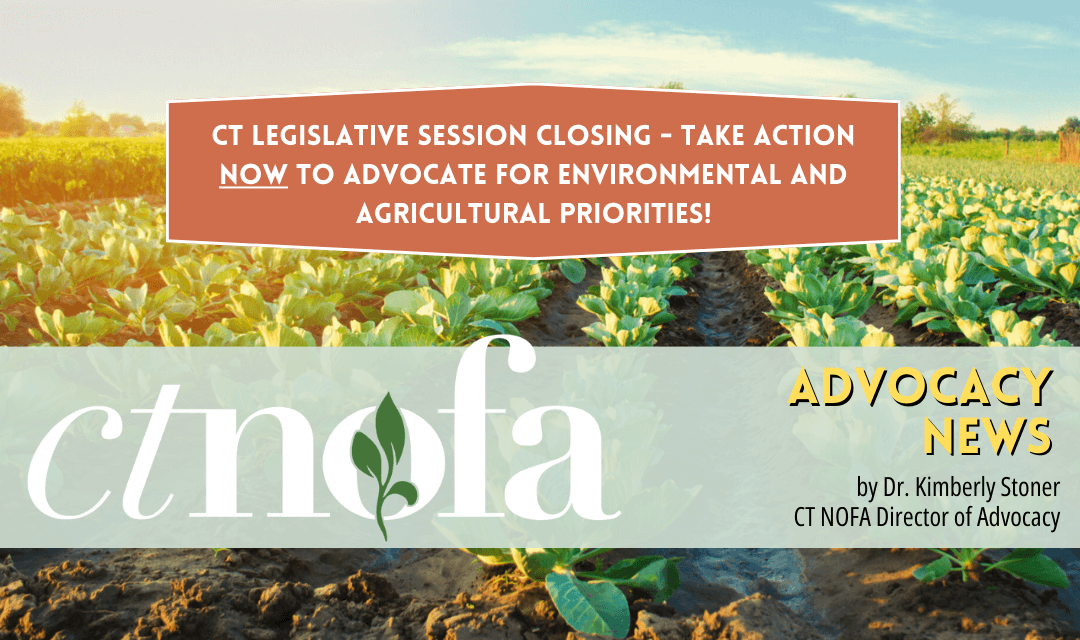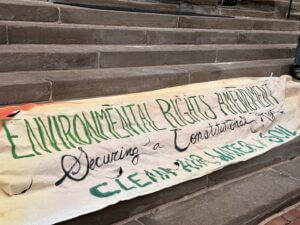Advocacy Alert – Legislative Session Ends on Wednesday!

April 26, 2024
Time is running out on important state legislation! Any bills that haven’t passed by Wednesday night are dead until next January. As the session staggers to a close, only the highest priority bills get attention. Make sure your legislators know that these bills are high priority for you!
Who to call
Your own state legislators: Enter your address here and find your legislators.
Say that you are a constituent. They get lots of calls, but they need to pay attention to the people in their district who will elect them — or vote them out — in November.
You can also call
Senate Leadership
- Martin Looney: 860-240-0375
- Bob Duff: 203-840-133 or 860-240-0414
House Leadership
- 860-240-8585 – Ask for Speaker Matt Ritter and call again and ask for Majority Leader Jason Rojas.
What to Advocate For
To Support in the Senate
SJ 193, the CT Environmental Rights Amendment. Maya van Rossum of Green Amendments for the Generations spoke passionately during her keynote address at our Winter Conference about the importance of putting environmental rights into our state constitution. We need the Senate to vote on this resolution and move it forward to the House. You can also ask your legislators to cosponsor this resolution at this link.
HB 5004. Implementation of Programs against Climate Change. This is the top priority for the CT Coalition for Climate Action, of which CT NOFA is a member. The bill would declare a climate crisis, which would make CT eligible for certain federal funding. There are provisions for tax rebates for farms that are “sustainable from a climate perspective,” which should certainly include organic farms! There are also provisions for planning for the installation of over 300,000 heat pumps and phasing out fossil gas. This bill passed in the House — now it needs to pass in the Senate.
SB 191, Food Scrap Diversion. This bill would require institutions that serve and distribute food (like groceries and restaurants) to have a plan for donating excess food to organizations that rescue food and give it to people who need it. Lori Martin of Haven’s Harvest led a workshop on food rescue at our Winter Conference. It would also require more food processors and other generators of food scraps to compost, and would require towns to plan for diverting food scraps for compost. Advocate to keep this bill strong and bring it to the floor.
SB 292. PFAS. This bill would ban the sale of a wide range of consumer goods with these “Forever Chemicals” that cause cancer and birth defects. It would also ban the sale of soil amendments with sewage sludge (aka “biosolids”), which are often contaminated with PFAS. Anne Hulick of CT Clean Water Action gave a workshop on PFAS at our Winter Conference. Advocate to keep this bill strong and bring it to the floor.
HB 5352. Expanding Solar Projects. This bill, which has just passed the House, would allow for expansion of caps on non-residential solar projects, which have been severely limiting the ability of farmers, among others, to install solar to produce energy to benefit their farming operations. It would also simplify the process for putting up solar canopies (over parking lots, walkways, driveways, etc.) Advocate for a vote in the Senate.
To Support in the House
SB 292. PFAS. This bill would ban the sale of a wide range of consumer goods with these “Forever Chemicals” that cause cancer and birth defects. It would also ban the sale of soil amendments with sewage sludge (aka “biosolids”), which are often contaminated with PFAS. Anne Hulick of CT Clean Water Action gave a workshop on PFAS at our Winter Conference. This bill passed unanimously in the Senate, now it needs to move in the House!
HB 5228. Purchase of Lands at Agricultural Value. This is the top priority for the New CT Farmers Alliance and the Working Lands Alliance. As part of the Farmland Preservation program, it would create the opportunity for farmers preserving their land to opt in to a provision that would require the land to be sold to a qualified farmer — a farmer who actually gets most of their income from farming. As a result, wealthy people who get most of their income elsewhere could not bid up the price of farmland, making it more affordable for farmers. Advocate for this bill to come to the House with a strong definition of a farmer purchaser.
Thank you for advocating for these priority bills!
Recent Posts
Bulk Order NOFA Membership Discounts
The Bulk Order, in its previous format, is no longer taking place. The legacy of the Bulk Order continues – not as a one-time order event, but as an ongoing member benefit that supports growers, and grows over time as we add more vendors and wholesale-level access.
For 2026, we are connecting members to quality organic growing supplies with a direct-to-consumer purchasing option through our program partners: Progressive Grower and Fedco Seeds.
Read MoreTown Halls Across Connecticut Rally Support for Environmental Rights Amendment
Representatives Matt Blumenthal and Gregory Haddad, Senator Mae Flexer, Community Members, and Activists Call for the state legislature to pass an Environmental Rights Amendment during the 2026 Legislative Session
Read More

